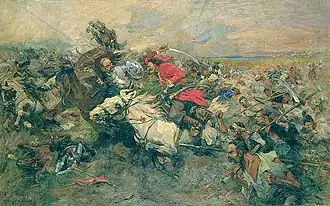Battle of Makhnivka
| Battle of Makhnivka | |||||||
|---|---|---|---|---|---|---|---|
| Part of the Khmelnytsky Uprising | |||||||
 Battle of Maksym Kryvonis with Jeremi Wiśniowiecki by Nikolay Samokish | |||||||
| |||||||
| Belligerents | |||||||
|
|
| ||||||
| Commanders and leaders | |||||||
|
|
| ||||||
| Strength | |||||||
| 13,000 | Unknown | ||||||
| Casualties and losses | |||||||
| Unknown | 2,500 killed | ||||||
The Battle of Makhnivka[a] took place between the Cossack-peasant army led by Maksym Kryvonis and the Polish–Lithuanian forces led by Jeremi Wiśniowiecki, it took place during 6–8 July in 1648, ending in Cossack victory.[1]
Prelude
The Makhnivka fortress served as one of the Polish-Lithuanian strongholds in Bracław Voivodeship. In late June and early July, several thousand rebel peasants gathered near Makhnivka. Jeremi Wiśniowiecki retreated from the Left-Bank Ukraine and entered Bracław Voivodeship. Most the region was controlled by the rebel peasantry and Cossacks of Maksym Kryvonis.[2]
Wiśniowiecki's forces was the only well-armed detachment capable of facing the rebels during this period, whose fighting methods were often accompanied with massacres. Bohdan Khmelnytsky sent 5,000 Cossacks led by Ivan Girya. Another 8,000 Cossacks of Ostap Kryvonosenko and Maksym Kryvonis joined in besieging Makhnivka.[2]
Battle
On 8 July, Cossacks and rebel peasants besieged Makhnivka. Cossacks successfully stormed and captured most of the fortress and were now besieging the castle where Stefan Lev was holding out with his troops.[2] Cossack attempts to storm the fortress, which was initially unsuccessful. Cossacks captured Bernardine monastery and made another assault on the castle.[3] They managed to lur Lev out of the castle and took the castle. Polish-Lithuanian forces suffered heavy losses and Lev himself was killed. Janusz Tyszkiewicz received the news about capture of Makhnivka and requested for Wiśniowiecki to deal with the rebels.[2]
In the evening, Wiśniowiecki attempted to quietly surround Makhnivka with his large army, but was unsuccessful. Kryvonis was outside Makhnivka with his cavalry where he took Wiśniowiecki by surprise in the attack, which nearly got Wiśniowiecki killed twice. Wiśniowiecki attempted to destroy Cossack camp at night several times, but was repulsed. Tyszkiewicz later requested for Wiśniowiecki to cease his attacks due to the risk of Tyszkiewicz's estate getting completely burnt by Cossacks if they prevail over Wiśniowiecki's forces.[2]
Aftermath
The battle resulted in destruction of Makhnivka and weakening of the Polish-Lithuanian influence.[1] More fighting shortly took place between the forces of Maksym Kryvonis and Jeremi Wiśniowiecki at Kostiantyniv and Pyliavtsi.[2]
According to Samiilo Velychko, Wiśniowiecki's forces in failed attacks on Makhnivka suffered 2,500 killed and Wiśniowiecki was forced to retreat. Wiśniowiecki was left traumatised by the experience of nearly getting killed twice in a single battle, losing his courage that he previously had in fighting Cossacks directly.[4]
Polish sources describe the battle differently. According to Polish noble report, Cossacks withdrew from Makhnivka behind a hill when Wiśniowiecki approached, organising a defense out of carts and other material. Wiśniowiecki launched two failed attacks, but didn't dare to attack for third time due to rain, which put Cossacks into a favourable defensive position. Cossacks then pretended to have organised a strong defense and made their presence known with singing, but in the morning broke through to Hrytsiv. Some of Wiśniowiecki's forces made failed attempts to pursue the Cossacks. Afterwards, on Friday (3/10 July) Wiśniowiecki himself withdrew from Makhnivka. Later, Wiśniowiecki received the news about return of Kryvonis and his Cossacks to Makhnivka, but Wiśniowiecki didn't dare to return there.[4]
Legacy
The Jewish community of Makhnivka was first mentioned in 1648, which was an account of when Cossacks were reported to have seized the fortress, then proceeding with massacre of Poles and Jews.[5]
See also
Notes
References
- ^ a b Maria Lekhova (1 June 2025). "Історичні віхи Махнівки: від битви під проводом Кривоноса до промислового розквіту" [Historical milestones of Makhnovka: from the battle led by Kryvonos to industrial prosperity]. koziatyn.info (in Ukrainian). Retrieved 17 August 2025.
- ^ a b c d e f Goman Roman Volodymyrovych (2020). "Воєнна історія людства: Битва під Махнівкою (1648 р.)" [Military history of humanity: Battle of Makhnivka (1648)]. vseosvita.ua (in Ukrainian). Retrieved 17 August 2025.
- ^ Mytsyik 1992, p. 73.
- ^ a b Mytsyik 1992, p. 74.
- ^ Wigoder, Geoffrey; Spector, Shmuel (eds.). "Komsomolskoye". The Encyclopedia of Jewish Life Before and During the Holocaust: K-Sered. Yad Vashem. p. 653.
Bibliography
- Mytsyik, Yuriy (1992). "Максим Кривоніс" [Maksym Kryvonis] (in Ukrainian). Dnipropetrovsk: Ukrainian Historical Journal.